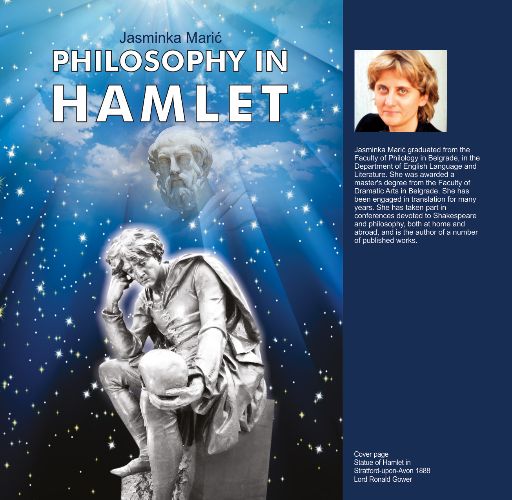
On the basis of the study of 'Hamlet' by Lev S. Vygotsky, the book Philosophy in 'Hamlet' points out the philosophical problems set in Shakespeare's enigmatic tragedy: the problem of being, the problem of the nature of reality, or another reality and another world, the problem of the transcendent, as well as the problem of time which is associated with a four-dimensional perception of reality, feelings of absurdity and meaning, drawing parallels between Jung's phenomenon synchronicity and the tragedy of Hamlet, then the problem of the supernatural, idem est the metaphysical, and the philosophy expressed in the tragedy of 'Hamlet'.
Reviewers: Radoslav Djokic, Professor of aesthetics: "The thesis of Jasminka Marić systematically analyzes Shakespeare's most famous play. The author rightly relies on Vygotsky's extraordinary study, in view of the compatibility of the basic assumptions of both studies. The ontological sphere is vast, if not boundless, but the author has captured with her research 'network', the most important aspects of it, in fact, those most important for Shakespeare's work. Thanks to this procedure, she has succeeded in illuminating the multi-layered structure of Shakespeare's drama, in her own authentic way. "
Mirko Zurovac, Professor of aesthetics and ontology: "The basic thesis from which the author begins is that the tragedy of" Hamlet "is essentially a metaphysical tragedy and that a metaphysical discourse, rather than a philological one, is appropriate for the analysis of ontological aspects in this work of art. Moreover, she adds seven of her own poems in an appendix, and these are pervaded with metaphysical inspiration, which in a direct poetic way indicates the metaphysical passion of the author writing this important and very interesting book. "
Vladislava Gordić Petković, Professor of English literature: "Jasminka Marić breaks down the layered and inexhaustibly interpretable text of the most famous drama by William Shakespeare, performing a precise and meticulous analysis of the ontological aspects of a thematically and semantically heterogeneous work. has proved to be not only an attractive starting point for the research of critical-methodological postulates of various theories but also a rewarding area for clarifying the postulates of artistic creation. positions the philosophical and critical corpus, which in the recent history of critical thought, is still insufficiently read and studied.The study before us is not only an original contribution to the study of the philosophy of Hamlet, but it is also a successful attempt to fill empty spaces in the reception of this tragedy. "